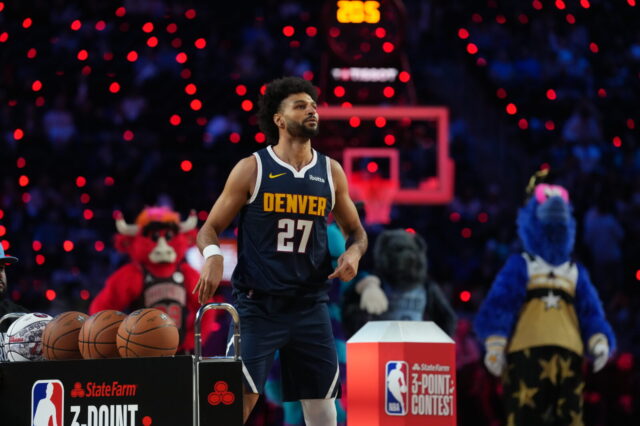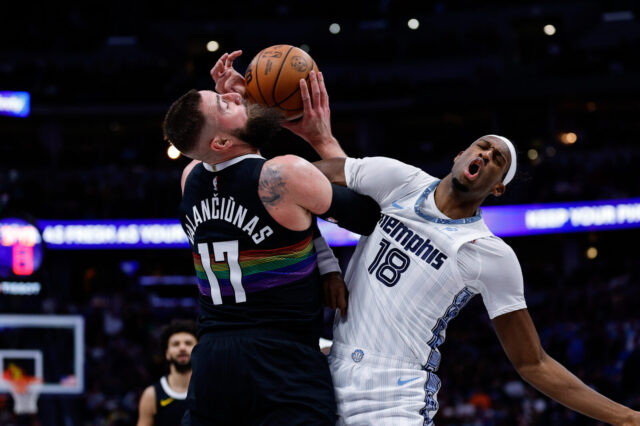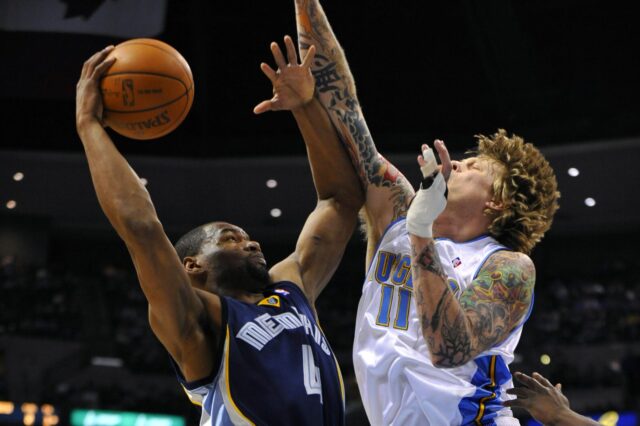As a rookie for the Denver Rockets during the American Basketball Association’s (ABA’s) 1969-70 season, power forward Spencer Haywood averaged a league best 30.0 ppg and 19.5 rpg to go along with an All-Star Game MVP, a Rookie of the Year Award and the league’s Most Valuable Player Award while leading the Rockets to the ABA’s West Division Finals where he averaged 37.0 ppg. Unfortunately, the NBA’s Seattle Supersonics would poach Haywood after his rookie season in Denver making his magical and memorable 1969-70 campaign his lone season in the Mile High City. But regardless of how it ended, Haywood’s 1969-70 campaign was arguably (or is it inarguably?) the greatest single season by a player in Denver Rockets / Nuggets franchise history (the franchise became the Nuggets in 1974, an homage to the long defunct Denver Nuggets of 1949-50).
With Haywood getting inducted into the Naismith Memorial Hall of Fame this month (alongside another former Nugget, Dikembe Mutombo) it got me thinking: including Haywood's 1969-70 season, what were the best individual seasons in Rockets / Nuggets history by position? In order to make this list, I have a few loose criteria:
1) Statistically, the player's season was at an All-Star or even superstar-caliber level. As my colleague Adam Mares pointed out, Haywood's 1969-70 Rockets played at a much higher pace than modern NBA teams do but 30 / 20 is STILL unbelievable for any professional basketball era.
2) Beyond the statistics, the player had an intangibly positive impact on the team and the community of Rockets / Nuggets fans that followed him at the time.
3) The player led the team to (some) post-season success. Unfortunately, as Rockets / Nuggets fans we have to use the word "some" here.
With those three criteria in mind, here is a breakdown of the best individual seasons in Nuggets history by position …
POWER FORWARD: SPENCER HAYWOOD (1969-70)
With all due respect to Kenyon Martin's 2008-09 season (jokes! jokes!), Haywood's 1969-70 season is unrivaled by all the power forwards who came before and after him in a Denver professional basketball uniform. As a fish-out-of-water 20 year old kid from Detroit playing in Denver in 1969, Haywood thrived in the ABA's third season. Coming off a 44-win season, the Rockets win total was upped to 51 with Haywood leading the way. And Haywood's remarkable accomplishment of winning an All-Star Game MVP, Rookie of the Year and MVP Award while winning the league's scoring and rebounding titles has only happened once more in professional basketball history: Wilt Chamberlain's 1959-60 rookie NBA season.
Runner Ups: Antonio McDyess (2000-01), Calvin Natt (1984-85), Julius Keye (1970-71), LaPhonso Ellis (1993-94)
SMALL FORWARD: ALEX ENGLISH (1985-86)
From his arrival in Denver in 1980 through 1990, Hall of Famer Alex English didn’t have a bad season in a Nuggets uniform and appeared in eight consecutive All-Star Games. So it’s quite difficult to pick “the best” Alex English season of the bunch. In 1982-83, English led ALL NBA players in scoring with 28.4 ppg. And in 1984-85, English averaged 27.9 ppg to go along with nearly six rebounds and four assists per game as his Nuggets won an (at the time) NBA franchise-best 52 games and appeared in just their second (again, at the time) Western Conference Finals in their NBA franchise history.
But for my money, English's 1985-86 season was his – and the franchise's – best ever for a small forward. Not only did English average a career-high 29.8 ppg while leading the Nuggets to 47 wins in a brutally competitive Western Conference, but English's Nuggets went toe-to-toe with the eventual Western Conference Champion Houston Rockets in six games in the 1986 conference semifinals. In a memorable Game 6 in Denver, English scored 42 points in a double-overtime thriller that sadly ended with a Rockets' 126-122 victory (nearly eclipsing Haywood's 45 points in a 1970 ABA playoff game). And at season's end, English was named to the All-NBA Second Team.
Runner Ups: Alex English (1984-85), Alex English (1982-83), Carmelo Anthony (2007-08), Carmelo Anthony (2009-10), Alex English (1987-88)
CENTER: DAN ISSEL (1975-76)
Hall of Famer Dan Issel gave his best basketball to his hometown Kentucky Colonels of the ABA from 1970 through 1975, but when Issel joined the Nuggets in 1975 as a 27 year old, six-year veteran he still had plenty in the tank. Despite being listed at 6'9", Issel started in all 84 games at center for the Nuggets in 1975-76 and along with superstar shooting guard David Thompson led the Nuggets to 60 wins and an ABA Finals appearance while averaging 23.0 ppg and 11.0 rpg and appearing in the 1976 ABA All-Star Game.
Issel didn’t just get it done in the regular season in 1975-76. In a critical (and heartbreaking) Game 6 of the ABA Finals versus Julius Erving’s New York Nets, Issel scored 30 points and grabbed 20 rebounds in the losing effort. And with the exception of Game 1 of that series, Issel never scored less than 21 points and never grabbed less than 11 rebounds in any single finals game.
Runners Up: Dan Issel (1976-77), Dan Issel (1977-78), Dikembe Mutombo (1993-94), Byron Beck (1968-69), Mike Green (1974-75)
SHOOTING GUARD: DAVID THOMPSON (1977-78)
How's this for an NBA season at the shooting guard position as a 23 year old? 27.2 ppg on 52.1% shooting, 4.9 rpg and 4.5 apg. Oh, and a 73-point game, tied for fourth best in NBA history. The Nuggets' David Thompson (aka "The Skywalker") did all that and led his Nuggets to their first of (only) three Western Conference Finals in NBA franchise history in 1978. And for those who don't remember Thompson's prowess as an all-time great two-guard, just watch this …
Like English, Thompson had several great seasons as a Nugget so it's hard to pick just one. But his 1977-78 campaign was probably the best of a seven-season Denver career that ended, tragically, too soon.
Runners Up: David Thompson (1975-76), David Thompson (1976-77), Ralph Simpson (1971-72), Allen Iverson (2007-08)
POINT GUARD: LAFAYETTE "FAT" LEVER (1987-88)
When Lafayette “Fat” Lever was honored by the Nuggets in April, we delved into what a remarkable career the 6’3″, 170-pound point guard had in Denver. A triple-double machine, Lever led the NBA in that elite category with 16 in 1986-87 but his Nuggets won just 37 games. During the following season, however, Lever would finish second in triple-doubles while leading the Nuggets to their (at the time) NBA franchise-best 54 wins and averaging 18.9 ppg, 8.1 rpg, 7.8 apg and 2.7 spg. Lever would be rewarded that season with his first and only NBA All-Star Game start and was selected for the NBA All-Defensive Second Team. Unfortunately, an injury prevented Lever from competing in Games 4 through 6 of the Nuggets’ semifinals matchup versus the Dallas Mavericks and probably cost the Nuggets whatever chance(s) they had of going deep into the post-season in 1988.
But despite the post-season disappointments of that era, Lever's 1986 through 1990 seasons were the best run for a point guard in Nuggets history.
Runners Up: Fat Lever (1986-87), Fat Lever (1989-90), Chauncey Billups (2008-09), Mahmoud Abdul-Rauf (1993-94), Michael Adams (1990-91)
COACH: DOUG MOE (1987-88)
You can't write for a website named Denver Stiffs and not give the Big Stiff himself – Doug Moe – the top coaching season in Denver Rockets / Nuggets franchise history. Not only did Moe's 1987-88 Denver Nuggets win a then-NBA franchise best 54 games, but they did it coming off a disastrous 37-win season with essentially the same roster and during what I've long argued was the best and most competitive season in NBA history. The NBA noticed too, awarding Moe with the league's Coach of the Year Award at season's end.
Runners Up: Larry Brown (1975-76), George Karl (2008-09), Doug Moe (1984-85), Larry Brown (1977-78), George Karl (2012-13)
This content is no longer available.


